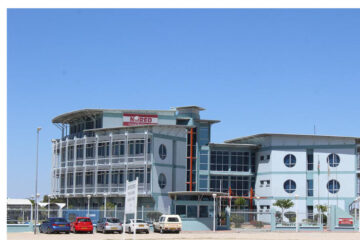Niël Terblanché
A delegation of farmers from the Kavango West region has acquired crucial agricultural knowledge during a benchmarking visit to Olushandja in the Omusati region.
Facilitated by the Food and Agriculture Organization of the United Nations (FAO), the visit, which took place last Thursday, was led by Sirkka Ausiku, the governor of the Kavango West region.
The visit aimed to enhance productivity and resilience among farmers by transferring knowledge of the various production methods used in Namibia.
The initiative followed recommendations from the Kavango West Agriculture Conference held in November 2024.
Speaking during the visit, Ausiku reiterated the importance of equipping small-scale farmers with the skills to transition into commercial farming.
“Small-scale farmers need to be supported so that they can graduate from subsistence farming into commercial farming, ensuring sustainable livelihoods. Kavango West has the potential to become Namibia’s breadbasket, and agriculture can play a key role in addressing poverty and unemployment in the region,” she said.
The farmers toured various horticulture farms in Omusati, gaining insights into efficient farming techniques, cooperative management, and market access strategies.
The governor of the Omusati region, Erginus Endjala, pointed to the importance of regional collaboration in improving agricultural output.
“It’s high time that small-scale farmers produce enough to compete with major retailers. I encourage farmers to form cooperatives, such as the Olushandja Horticulture Farmers’ Cooperative, and find ways to create markets for their produce. Initiatives like this between regions should happen more often, as they allow farmers to exchange ideas and create a food-secure future for Namibia,” he said.
Among the participants was Gottfried Haikera, a horticulture and poultry farmer from Tondoro village in Kavango West, who expressed admiration for the way Olushandja farmers have structured their cooperatives.
“Their ability to market their produce and supply to various clients is something I hope to replicate in my own farming business,” he said.
Josephine Kamaranga, a youth horticulturist from Katjinakatji, said the visit had motivated her to expand her farm and encouraged other young people to consider farming.
“This visit impressed me so much that I am now very motivated to apply what I have learned and expand my horticulture farm to produce on a larger scale. Let’s not shy away from hard work. This visit inspired me when I saw farmers driving cars and supporting their families through farming,” she said.
FAO National Project Coordinator Gift Kamupingene reiterated the importance of knowledge exchange in building resilience in agriculture.
“At the FAO, we believe that learning from successful farming models is key to strengthening agricultural production and improving food security. By fostering collaboration and knowledge exchange, we are empowering farmers to adapt to climate challenges, enhance productivity, and contribute to Namibia’s broader food security goals,” he said.
The visit was funded through the FAO-led project titled ‘Emergency response to enhance resilience and mitigate climate-induced impacts on livelihoods, food and nutrition security of the most vulnerable households in Namibia,’ which is fully sponsored by the Government of Japan.
According to Kamupingene, the initiative provided practical exposure and also increased networking among farmers from different regions, reinforcing the need for continued cross-regional exchanges in the agricultural sector.




